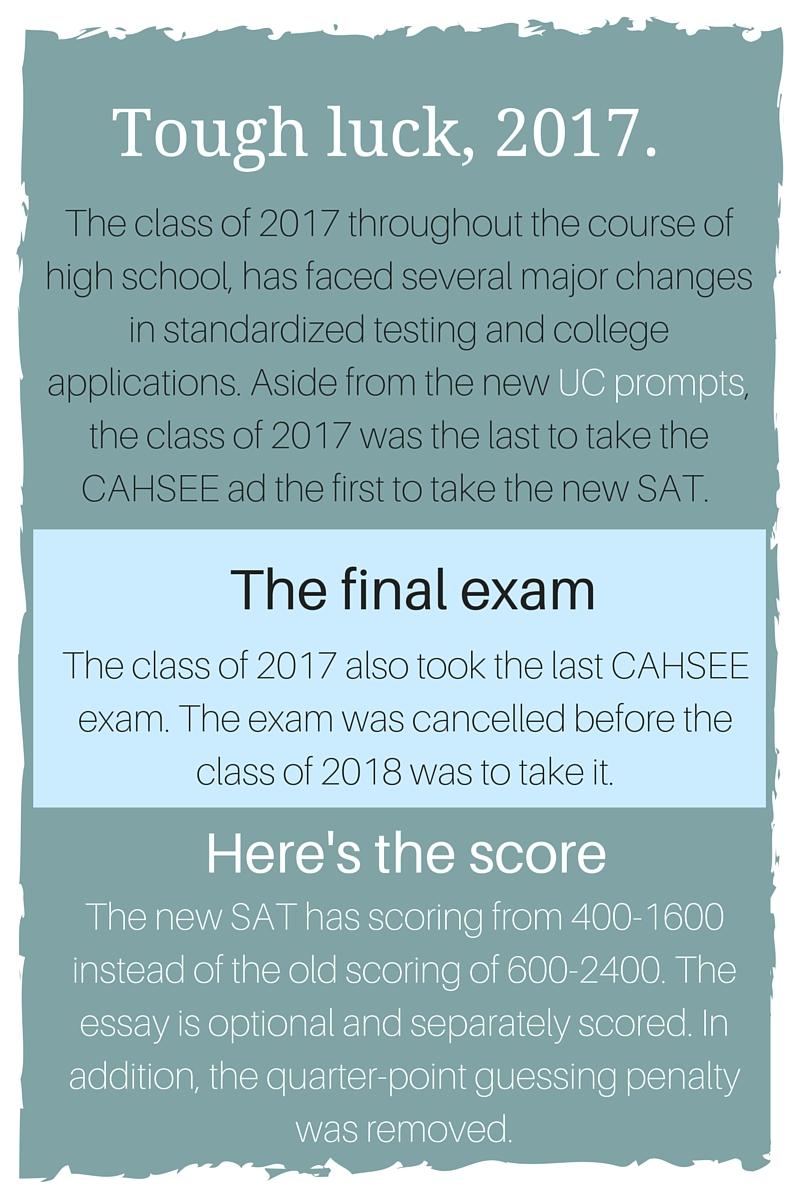our prompts, 1,400 words. Starting next year, this is how each University of California applicants will get to express what they’ve learned from their 17 or 18 years of life experiences.
College essays have become synonymous with college applications. But recently, the UC system changed its college essay prompts, completely replacing the essay altogether, saying that it’s their hope that the new format will offer students “clearer guidance and more flexibility in the kind of information you want to share with us.”
Instead of a singular essay, applicants are now offered eight short answer prompts. Each applicant can pick four of these prompts, with a word limit of 350 words per prompt. While previously, an essay had a maximum of 1,000 words, the new process allows for up to 1,400 words. The new change will affect the class of 2017, along with future classes.
AVID classes have a curriculum that works closely with college preparation and college applications, and AVID and English teacher Jackie Corso’s students originally had mixed feelings about the change, since they had already done some work with the old UC prompts during first semester. But after they adjust to the change, Corso thinks that the new transition offers some benefits.
“There’s more variety. I think they’re trying to offer more opportunities for you to really write about yourself as an individual which, in theory, is good,” Corso said. “As long as students are able to find and access a prompt that works for them and allows them to showcase the positive qualities of themselves, it’s just a matter of doing it in 350 words, which is a challenge.”
Math and science teacher Michael Lordan went to schools within the area growing up, finishing his primary education at Cupertino High School. He attended UC Davis, and although he doesn’t exactly recall the details of his application prompt, he does remember the stress he felt while writing his college essays. And as someone whose strengths lie in the maths and sciences, he feels like the new change with short answer questions would have helped to reduce his stress when applying.
“I think it’s kind of nice to have it chunked so you can tackle smaller pieces at a time,” Lordan said. “There’s some flexibility for which ones you pick, so you can pick prompts that are maybe more applicable to you.”
Other teachers, like English teacher Shannon Hoopes, find more benefit in the old college prompts.
“I feel like that would showcase writing ability a little bit more, rather than having discrete short answer questions,” Hoopes said. “But the ability to integrate ideas into one cohesive piece of writing that really shows who you are… As an English teacher, I think I’d definitely prefer that.”
As a Mythology teacher, Hoopes also incorporates personal memoir writing into the curriculum. The first semester final is a Personal Myth Project, where students write about the “myths of their lives,” like where they came from and what their influences are. The entire project is a very personal reflective assignment.
But to her, writing about personal experiences doesn’t only help with college essays, but is beneficial out of the classroom too, serving as an easy way for students to reflect on their own lives in an experience that Hoopes considers to be extremely important.
I think it’s helpful for anyone to reflect on their life,” Hoopes said. “That’s a useful skill to have as a person and certainly important in high school when you’re figuring out who you are. [You] take the time to think about that, like, ‘What has shaped you? What do you really want to do in the future?’”
For seniors who have already finished their college  applications, the changes don’t concern them. While some may have appreciated the shorter prompts, senior Janani Vijaykumar actually preferred having the full 1,000 word essay. Other schools she applied to, like Purdue had a short prompt that had a 650 word limit and reflecting back on college applications, Vijaykumar feels like those applications were definitely more difficult for her since the word count set some limitations.
applications, the changes don’t concern them. While some may have appreciated the shorter prompts, senior Janani Vijaykumar actually preferred having the full 1,000 word essay. Other schools she applied to, like Purdue had a short prompt that had a 650 word limit and reflecting back on college applications, Vijaykumar feels like those applications were definitely more difficult for her since the word count set some limitations.
“You can’t beat around the bush and add your own personal style as easily, but with the 1,000 word essays, you have lots of room to really talk about what you want to do and form a full fledged perception of yourself,” Vijaykumar said. “With the shorter essays, it’s just harder to come across the way you want.”
Junior Tejal Deshpande, who is in Corso’s AVID class, actually expected the new change to result in a shorter application, but was surprised to find out the new change actually allowed an applicant to write more. After overcoming that initial shock, she came to appreciate the new change.
“I love writing, so [the new prompts are] kind of like creative thoughts that go through your mind,” Deshpande said. “There’s a lot of options you can choose for the prompts.”
But Corso believes that regardless of how the UC prompts change in the future, the desire to go to a UC will outweigh any unhappiness over the potential changes.
“People will probably freak out and complain, but at the end of the day, there’s nothing they can do about it, so they’re going to buckle in and do it anyway,” Corso said. “It’s just a matter of adapting. The longer you complain, the more you put off an inevitable change.”










